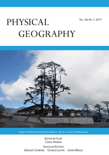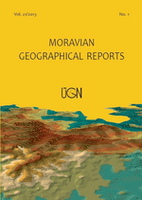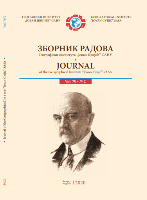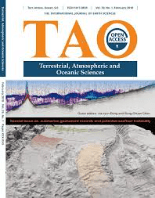
PHYSICAL GEOGRAPHY
Scope & Guideline
Advancing Knowledge in Physical Geography
Introduction
Aims and Scopes
- Geomorphology and Landscape Dynamics:
Focused on the study of landforms, processes shaping the Earth's surface, and their implications for environmental change. This includes research on river morphology, erosion rates, and sediment transport. - Climatology and Hydrology:
Explores climate variability, precipitation patterns, and hydrological cycles, with an emphasis on their impacts on ecosystems and human activities. Studies often involve both historical analyses and predictive modeling. - Paleoclimatology and Environmental Change:
Investigates past climate conditions through sediment records, ice cores, and other geological proxies to understand long-term climate trends and their implications for contemporary environmental issues. - Ecological Interactions and Biodiversity:
Studies the relationships between physical geography and biological diversity, including the impacts of climate change on species distribution and ecosystem services. - Technological Innovations in Geography:
Incorporates new methodologies and technologies such as remote sensing, GIS, and machine learning to enhance research in physical geography, particularly in data collection and analysis. - Human-Environment Interactions:
Examines how human activities influence physical processes and landscapes, including urbanization, agricultural practices, and disaster management.
Trending and Emerging
- Climate Change Impacts and Adaptation:
There is a growing emphasis on understanding the impacts of climate change on physical landscapes and ecosystems, as well as on developing adaptation strategies to mitigate these effects. - Machine Learning and Big Data Applications:
The integration of machine learning techniques and big data analytics into physical geography research is on the rise, enhancing the precision and scope of environmental modeling and prediction. - Citizen Science and Community Engagement:
Research involving citizen science initiatives is increasingly prominent, highlighting the role of public participation in data collection, monitoring environmental changes, and fostering community resilience. - Fire Regimes and Ecosystem Dynamics:
The study of fire dynamics and their ecological implications is gaining attention, particularly in the context of changing climate patterns and their effects on biodiversity and land management. - Hydrological Modeling and Water Resource Management:
Innovative approaches to hydrological modeling, including the assessment of water resource impacts due to climate variability, are becoming more prevalent, addressing crucial water management challenges.
Declining or Waning
- Traditional Land Use Studies:
Research focusing on static land use patterns and agricultural practices has decreased, possibly due to a shift towards dynamic interactions and adaptive management approaches in response to climate change. - Static Climate Models:
There appears to be a waning interest in traditional, static climate models that do not incorporate recent advances in machine learning and data analytics, which offer more nuanced insights into climate variability. - Geological and Geological Hazard Mapping:
Although still relevant, studies focused exclusively on geological mapping and hazard assessment without integrating broader environmental or climatic contexts seem to be less frequent.
Similar Journals

Geografie
Fostering innovative solutions through rigorous research.Geografie, published by the Czech Geographic Society, serves as a vital resource in the fields of geography, planning, and development. With an E-ISSN of 1212-0014, this esteemed journal has been contributing to the academic landscape since its inception in 1992, providing a platform for rigorous research and diverse perspectives on earth-surface processes and regional development issues. Based in the heart of Prague at Charles University, it has reached an impressive convergence of scholarly excellence, ranking in the Q3 category for both Earth-Surface Processes and Geography, Planning and Development as of 2023. Although it does not currently offer open access, the journal is indexed in Scopus, holding significant positions within its realms—392nd out of 821 in Social Sciences and 89th out of 179 in Earth and Planetary Sciences—indicating its relevance and contribution to ongoing discussions in both disciplines. As an indispensable tool for researchers, professionals, and students alike, Geografie not only enhances the understanding of spatial processes but also fosters innovative solutions for contemporary geographical challenges.

LANDSCAPE ECOLOGY
Connecting Ecology, Geography, and ConservationLANDSCAPE ECOLOGY, published by SPRINGER, is a premier journal dedicated to the field of landscape ecology, bringing together innovative research that intersects ecology, geography, and conservation. With a prestigious history since its inception in 1987, this journal showcases high-impact studies reflected in its impressive 2023 rankings in the first quartile of Ecology, Geography, Planning and Development, and Nature and Landscape Conservation categories. Operating from the Netherlands, LANDSCAPE ECOLOGY serves as a critical platform for scholars and practitioners aiming to advance their understanding of spatial analysis, environmental challenges, and landscape management. While the journal operates on a traditional access model, the quality and rigor of published research ensure it remains a vital resource for the academic community, inspiring a deeper exploration of our dynamic natural environments and the socio-ecological interactions within them.

Moravian Geographical Reports
Innovating Dialogue in Geography and Planning DiscoursesWelcome to the Moravian Geographical Reports, an esteemed Open Access journal published by SCIENDO, dedicated to advancing the fields of Earth and Planetary Sciences as well as Geography, Planning and Development. Established in 1993, this journal has steadily built a reputation for disseminating high-quality research, evidenced by its 2023 Q2 ranking in both relevant categories and an impressive Scopus percentile ranking of 72. With a dedicated editorial board and an expanding global readership, the Moravian Geographical Reports serves as a vital platform for researchers, professionals, and students alike, fostering dialogue and collaboration across various dimensions of geographical and environmental studies. Since its shift to Open Access in 2013, it has significantly enhanced the accessibility and reach of its published works, making crucial research findings available to a broader audience. The journal continues to thrive as a significant contributor to the geographical and earth sciences discourse during its converged years from 1993 to 2024.

Miscellanea Geographica
Unveiling the Complexity of Our PlanetMiscellanea Geographica, published by SCIENDO, is a prominent open-access journal established in Germany that contributes significantly to the fields of Earth and Planetary Sciences and Geography. With an ISSN of 0867-6046 and an E-ISSN of 2084-6118, this journal has been a platform for scholarly dissemination since 1984, encompassing a diverse range of interdisciplinary research areas. Since transitioning to open access in 2011, it has made its content widely available, enhancing visibility for researchers and practitioners across the globe. In the 2023 category quartiles, Miscellanea Geographica is ranked Q3 in both Earth and Planetary Sciences (miscellaneous) and Geography, Planning and Development, reflecting its commitment to quality scholarship. This journal is specifically designed to foster dialogue and collaboration among researchers, professionals, and students, making it a vital resource for those invested in the intricate relationships between geography and societal development. Researchers are encouraged to contribute groundbreaking studies that not only advance academic understanding but also address real-world challenges.

MITTEILUNGEN DER OSTERREICHISCHEN GEOGRAPHISCHEN GESELLSCHAFT
Elevating Geographic Inquiry and InnovationMITTEILUNGEN DER OSTERREICHISCHEN GEOGRAPHISCHEN GESELLSCHAFT, published by the Österreichische Geographische Gesellschaft, serves as a vital resource within the fields of Geography and Earth-Surface Processes. This journal, with the ISSN 0029-9138, offers a platform for scholarly articles that contribute to the understanding of geographical phenomena, particularly focusing on regional and environmental issues based in Austria since its establishment. Although lacking Open Access options, the journal maintains rigorous publication standards and has seen converged issues from 1978 to 2008, and from 2011 to 2018, alongside recent volumes from 2020 to 2023. As a Q4 ranked journal in the Scopus categories for Geography, Planning and Development, and Earth-Surface Processes, it is strategically positioned to support researchers, professionals, and students striving to enhance geographical knowledge. As such, MITTEILUNGEN DER OSTERREICHISCHEN GEOGRAPHISCHEN GESELLSCHAFT continues to foster geographical discourse and innovation, contributing significantly to the academic community.

Journal of the Geographical Institute Jovan Cvijic SASA
Nurturing a community of scholars dedicated to geographical exploration.The Journal of the Geographical Institute Jovan Cvijic SASA is a premier academic publication dedicated to advancing research and knowledge in diverse fields such as Demography, Earth-Surface Processes, Geography, Geology, and Tourism. Published by the Geographical Institute Jovan Cvijic SASA in Serbia, this Open Access journal has made significant contributions to the academic community since its inception in 1951, allowing for unrestricted dissemination of research findings globally. With an impact factor reflected in its 2023 Q3 quartile rankings across several categories, the journal underlines its relevance by maintaining a significant standing in the Social Sciences and Earth and Planetary Sciences domains, demonstrating engagement at a global level evidenced by its Scopus rankings. The journal's commitment to publishing high-quality, peer-reviewed articles makes it an essential resource for researchers, professionals, and students seeking to explore and enhance their understanding of geographical and environmental dynamics.

Journal of Geographical Sciences
Charting New Territories in Geographical Research.Welcome to the Journal of Geographical Sciences, a premier publication in the field of Earth and Planetary Sciences that has consistently demonstrated its impact and relevance since its inception in 2001. Published by SCIENCE PRESS, this esteemed journal is recognized for its rigorous peer-review process and high-quality research, achieving an impressive Q1 ranking in the 2023 category of Earth and Planetary Sciences (miscellaneous). With the latest Scopus ranking placing it at Rank #13 of 159, putting it in the top 8% of its field, the journal serves as a vital platform for disseminating significant findings and innovative methodologies in geography, environmental studies, and related disciplines. Although not an open-access journal, it offers exceptional visibility through its publication standards and accessibility in academic databases. Based in Beijing, China, the Journal of Geographical Sciences continues to pave the way for scholarly discourse and collaborative research, appealing to researchers, practitioners, and students dedicated to advancing our understanding of geographical phenomena.

Entorno Geografico
Fostering Collaboration in Geography and Environmental StudiesEntorno Geográfico is a premier open-access journal published by University of Valle, dedicated to the field of geography and environmental studies. Since its inception in 2002, this journal has provided a dynamic platform for researchers, professionals, and students to disseminate innovative findings and engage in critical discussions regarding geographical phenomena and environmental challenges. With an ISSN of 1692-0074 and an E-ISSN of 2382-3518, it is recognized for its commitment to high-quality peer-reviewed content that reflects cutting-edge research trends within the discipline. The journal aims to enhance understanding of socio-environmental processes and contribute to the formulation of sustainable solutions to pressing geographical issues. By fostering an open-access model, Entorno Geográfico ensures that valuable knowledge is widely accessible, encouraging collaboration and advancing education in the field. Located in Cali, Colombia, the journal reflects a strong regional focus while embracing a global perspective, making it an essential resource for the international geography community.

TERRESTRIAL ATMOSPHERIC AND OCEANIC SCIENCES
Championing Open Access for Global Scientific DialogueTERRESTRIAL ATMOSPHERIC AND OCEANIC SCIENCES, published by SpringerNature, is a distinguished peer-reviewed journal that has been an essential platform for innovative research in the fields of atmospheric science, oceanography, and Earth and planetary sciences since its inception. With an Open Access policy established in 1990, the journal ensures wide dissemination of knowledge, allowing researchers, professionals, and students to access cutting-edge findings without restrictions. Based in Switzerland and featuring a comprehensive coverage from 1996 to 2024, the journal currently holds a Q3 ranking across various categories, indicating its growing significance in the scientific community. Although it is positioned within the 39th percentile in Earth and Planetary Sciences, its commitment to fostering high-quality research makes it a valuable resource for advancing understanding of terrestrial environments and their interconnections. Researchers seeking a platform for their work in atmospheric and oceanic sciences will find TERRESTRIAL ATMOSPHERIC AND OCEANIC SCIENCES to be an ideal venue for sharing their insights with a global audience.

Quaestiones Geographicae
Empowering Global Perspectives on Earth’s PhenomenaQuaestiones Geographicae, an esteemed open-access journal published by SCIENDO, serves as a vital platform for scholarly communication in the field of Earth and Planetary Sciences. Since its inception in 1979, the journal has been dedicated to promoting rigorous research and discourse in geography, encompassing a breadth of topics that reflect the dynamic nature of the discipline. With an impressive Impact Factor belonging to the Q3 quartile category, the journal actively contributes to the global scientific community's understanding of geographical phenomena. Its commitment to open-access publishing since 2010 ensures that groundbreaking research is accessible to a wider audience, facilitating collaboration and innovation. As part of its enduring legacy, Quaestiones Geographicae engages researchers, professionals, and students alike, inviting them to explore, share, and expand the boundaries of geographical knowledge.